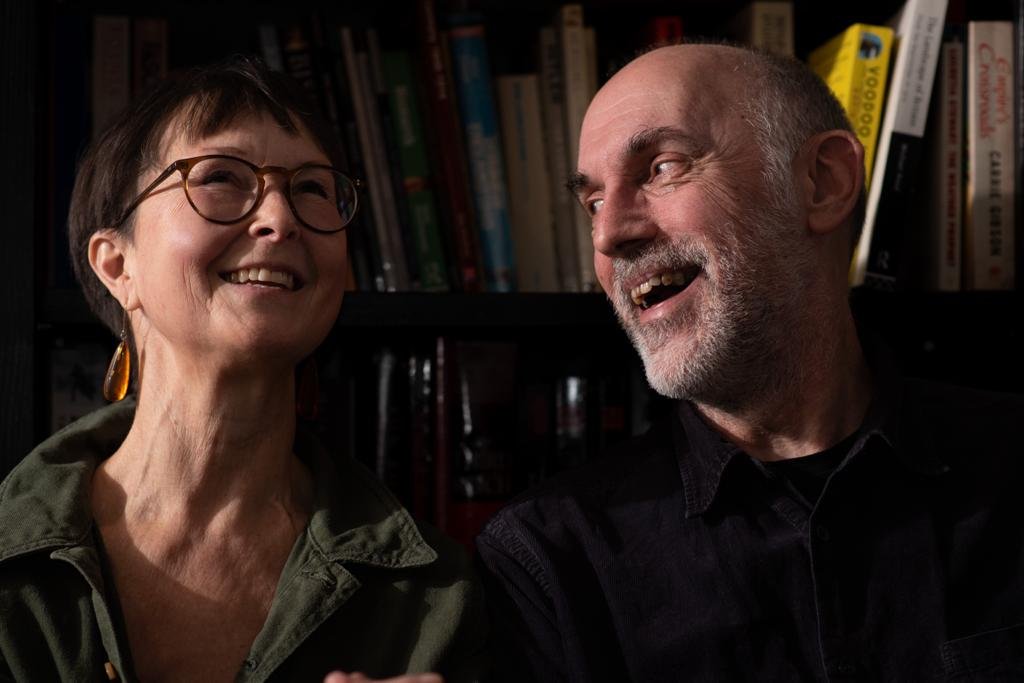
Why we talk history when we come to the History Café
Jon and Penelope have been revisiting key moments in history for the last six years. They approach the works of other historians with an open mind. Only after immersing themselves in the complexities of each period and asking each other common sense questions have they begun to propose a series of reinterpretations.
Who we are
Jon Rosebank
Jon took the top first for his year in Modern History at Oxford, scoring alphas in all his papers. He was quickly elected Fellow of New College, where he completed his D.Phil on English history, leaving five years later for the BBC. There he worked on history series, starting with Michael Wood and Christopher Frayling and becoming Executive Producer and Editor. He wrote, directed and produced many series for BBC television and later Channel 4, telling history stories from Neolithic archeology to trawling on the North Sea. In 1998 Jon left television to teach history. During the time he was head of department, over 90% opted for history at GCSE and over 40% at A-level. Departmental results were 20% above the school average. After 10 years Jon left teaching intending finally to give time to his own writing and TV work. A colleague wrote at the time, ‘the man is a whirlwind. His imagination and creativity are simply extraordinary.’
Author of ‘GN Clark and the Oxford History School. Hidden origins of 1066 And All That’ (English Historical Review 2020) and Partisan Politics. Looking for consensus in 18th century towns (University of Exeter Press 2021). Fellow of the Royal Historical Society.
Penelope Middelboe
Penelope is the author of two history books, We Shall Never Surrender (Macmillan 2011) and Edith Olivier from her journals: 1924-48 (Weidenfeld & Nicolson 1989). She was Script and Series Editor on animated films aimed at making cultural heritage accessible for HBO, BBC and S4C/Channel 4. Her series won eight EMMYs. Canterbury Tales was nominated for an Oscar. Sir Gawain and the Green Knight, which she co-wrote, won a BAFTA. Shakespeare – the Animated Tales and The Miracle Maker on the life of Jesus are both still widely used in schools.
From 2007 Penelope worked with the Shakespeare Schools Foundation (SSF) which uses performing Shakespeare in professional theatres to give young people a sense of self-worth. She became CEO in 2011 and in 2014 SSF reached 35,000 9-18 year olds across the UK. Penelope read history at Bristol and left SSF in 2014 to explore her own writing once again.
The History Café is the place to try out new ideas about historical episodes. We can check out stories that have got stuck in our collective memory and yet don’t seem to us to ring true. Together, we can ask ‘why would they do that?’, ‘can we believe that?’
We’re never going to be able to cram everything into one narrative. Like a good cup of coffee, there are going to be dark and complex secrets underneath the frothy top of events.
Finding another layer is always exciting. And we want you to pull up a chair, get yourself a hot drink, and join in the conversation.
Why the History Café?
What kind of history do we do?
We take a new and entertaining look at the stories we discuss. What marks out our conversations is that, however much we knock new ideas around, and however much fun we’re having with them, under the surface we’re always looking for the best research and working with sharply rigorous method. After all, there are sack-fulls of exciting new research hidden away in obscure and difficult academic publications, all waiting to be turned into stories that everybody can enjoy. So we follow our hunches and begin putting some of this history through our History Café mill.
When you stop to think about the history we all know, you quickly start to wonder whether we’ve got the right story …
For example, we rarely stop to ask how Hitler was able to mount a costly, mechanised world war when Germany had few of the raw materials needed for weapons and so soon after its defeat in World War One and the effects of the depression.
Most of us grew up thinking Hitler meant to invade Britain in 1940. But as soon as you stop to think about it, it makes no sense. Hitler had far more urgent targets - like the Soviet Union - and every ranking German officer knew that his navy was never anywhere near big enough to pull it off. German planes had sunk a few British ships while they were in harbour or just outside. But their pilots told Hitler to his face they could not protect a German seaborne invasion in the open Channel. So what was really going on?
Henry VIII puts his kingdom at risk because some junior maid at his court held out on him. You really have to be joking.
In 1605 Guy Fawkes and one other man were horribly tortured into ‘confessing’ that they were going to blow the English Parliament up. Nobody takes confessions extracted under torture seriously these days. So why is there no other evidence for the Gunpowder Plot at all?
Why did President Kennedy make a world-threatening crisis out of Soviet missiles on Cuba in 1962 when his own experts - and his allies - were all telling him loudly and clearly that he could safely just ignore them?
The British ended enslavement because the government was finally persuaded it was a bad thing to do? Or was it a matter of avoiding a financial crash?
Emmeline Pankhurst told her supporters that votes for women had been achieved in 1918 because of her exceptional leadership. It doesn’t look like it. In 1916 Mrs Pankhurst wrote to Tory politicians to say that she would be perfectly happy for the soldiers to get the vote, and not the women at all.
It’s always more exciting
than we expected
You let us do the hard thinking. We let you know what we find. Conspiracy theorists eat your heart out. This is history rooted in the best research and the best method. And what comes out of our History Café mill is astonishing and fun, history like you’ve never heard it.
Our big series are interspersed with individual episodes and short series on stories as diverse as Isaac Newton’s alchemy, the invention of Scottishness, and the hidden importance of 1930s Hollywood dress designer Adrian Greenberg.

What makes us different?
We immerse ourselves in the latest scholarship on a subject in world class libraries. Then we take a tough, rigorous look, before we sit back and throw it around at the History Café. And there….
We tamp down the evidence
We look at the story everyone knows, and then ask ‘what don’t we know?’ and ‘what do we really know?’ and how does that differ from ‘what we’ve been told?’ ‘and by whom?’ ‘and for what reason?’ And what do the sources tell us about who wrote them, and who they were written for?
We look around the room
We find out what else was going on at the time. The trick is to leave behind the usual suspects historians have got into the habit of talking to and take a moment to glance around a bit. Pull up some more chairs. Maybe go and sit at another table and see things from a different perspective. Widen the conversation. We ask ‘who has been left out of this story’, ‘by whom?’ and ‘for what purpose’? We see what they’ve got to say.
We run the story through our history coffee machine
We think about change over time – how the story develops as it goes on. Also about cause. History is real life. And real life is complex. Every event has many causes. Every individual has many motivations. We throw away the used grounds of myth and propaganda.
And we chat
Finally, because this is the History Café, we try out new ideas or theories on each other, and invite you to join in the conversation. Let us know what you think about our ideas. Contact us on Facebook, Twitter or through our contact page.












